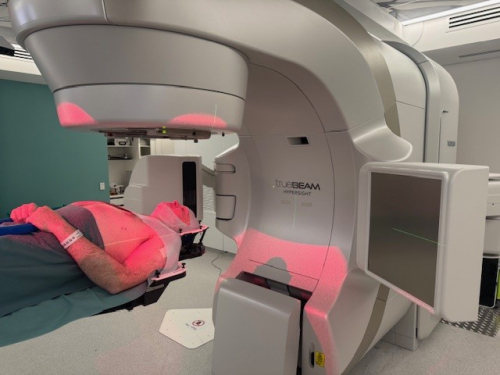New trial provides hope for incurable disease

The Alfred has launched a world-first clinical trial to investigate whether an existing medication can be used to treat people with Rett syndrome – a rare and catastrophic neurodevelopmental disease that currently has no cure.
ANAVEX®2-73 has previously been trialled to treat people with Alzheimer’s disease. The first Rett Syndrome patient received the first dose of the study medication at The Alfred on Thursday, 6 June.
Professor Terry O’Brien, Director of Neurology & Deputy Director of Research at Alfred Health, said this trial would provide hope for patients with Rett syndrome, where currently there is none.
“Rett syndrome is a devastating disease for patients and families, for which there are currently no treatments that improve the course of the disease. There is an urgent need for high quality, evidence-based treatments for Rett syndrome patients,” Professor O’Brien said.
“The Alfred is home to the only in patient neurology clinical trials ward in the country, where we are fortunate to offer patients the opportunity to participate in exciting new medical trials in the safety and comfort of a hospital ward setting, for which The Alfred Neurology Clinical Trials Unit is the ideal facility.”
The study will enrol around 30 patients across The Alfred and The Royal Melbourne hospitals. Patients will receive a once-daily dose of oral liquid, to evaluate the efficacy of ANAVEX®2-73 medication for Rett syndrome.
Claude Buda, President of the Rett Syndrome Association of Australia, said this trial was “a milestone” in the treatment of Rett in Australia.
“The Australian Rett community is very excited to participate in this long awaited trial, which gives us hope for our children as well as helping to improve their quality of life,” Mr Buda said.
“This is only the second approved site worldwide which we hope will fast track the access of drugs for all patients in Australia.”
About Rett Syndrome
Rett syndrome is a rare, non-inherited genetic neurodevelopmental disorder that occurs almost exclusively in girls and leads to severe impairments. The syndrome affects nearly every aspect of the child’s life: their ability to speak, walk, eat and even breathe easily.
The hallmark of Rett syndrome is near constant repetitive hand movements while awake. It is characterized by normal early growth and development (6 to 18 months) followed by a slowing of development, loss of purposeful use of the hands, distinctive hand movements, slowed brain and head growth, problems with walking, seizures and intellectual disability.
There is currently no cure for Rett syndrome. Management of symptoms is done through a multidisciplinary approach using medication for motor difficulties, breathing irregularities and control of seizures through anticonvulsant drugs. Rett syndrome is caused by mutations in the MECP2 gene and strikes all racial and ethnic groups and occurs worldwide in approximately one in every 10,000 to 15,000 live female births.


